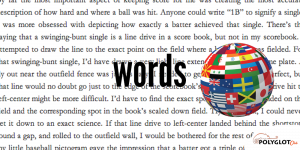Difference between revisions of "Language/Multiple-languages/Vocabulary/Must‐Know-Words-for-Polyglots"
< Language | Multiple-languages | Vocabulary
Jump to navigation
Jump to search
| Line 423: | Line 423: | ||
|Notice the differences between “phrase”, “clause”, “sentence”. | |Notice the differences between “phrase”, “clause”, “sentence”. | ||
|- | |- | ||
|[[wikipedia:Typography|typography]] | |||
{| class="wikitable" | |||
|[[wikipedia:Punctuation|punctuation]] | |[[wikipedia:Punctuation|punctuation]] | ||
{| class="wikitable" | {| class="wikitable" | ||
| Line 462: | Line 464: | ||
|- | |- | ||
|[[wikipedia:Space (punctuation)|space]] | |[[wikipedia:Space (punctuation)|space]] | ||
|} | |||
|} | |} | ||
|Punctuation. People often neglect it. | |Punctuation. People often neglect it. | ||
Revision as of 00:15, 4 May 2020
Must-know words for polyglots.
[Lesson in progress]
Polyglots are really passionate about language learning and linguistics. Therefore it's important for them to learn all kinds of terms. On this page, you will find the most important ones.
If you need a full GLOSSARY OF LINGUISTIC TERMS, see:
If you need a clear categorization of linguistics, see:
-- AUTHOR --
